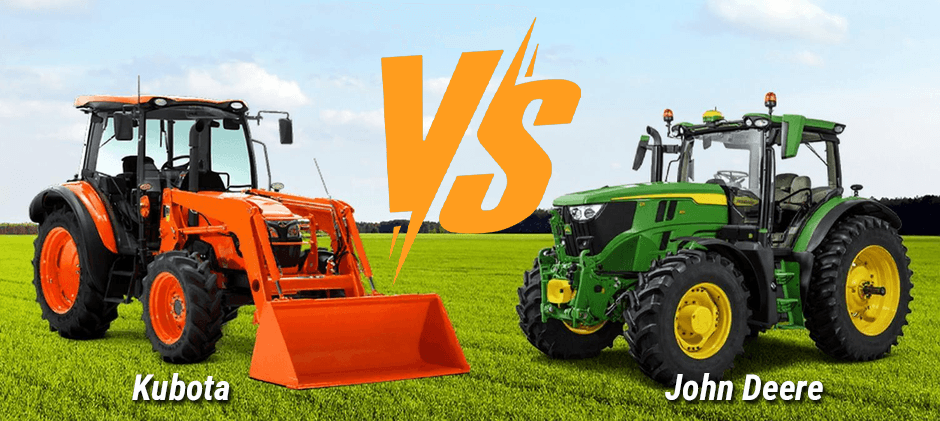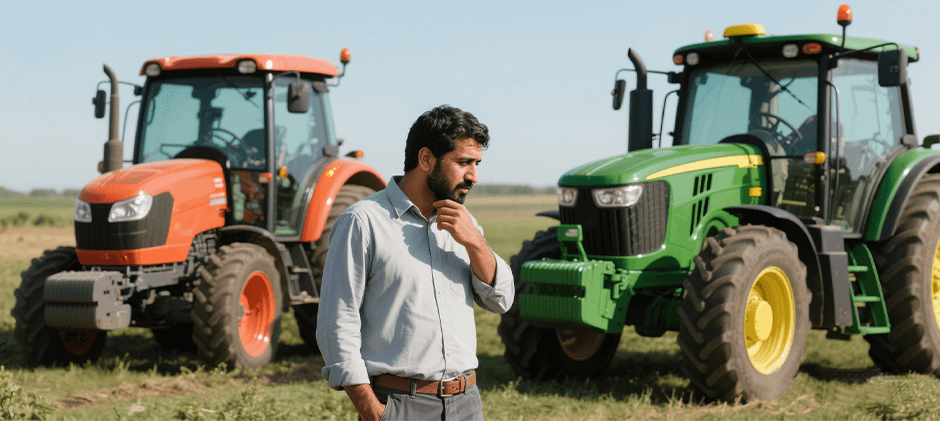Kubota and John Deere stand as two of the most trusted tractor brands in the world, backed by decades of reliability in farming and property care. If you’re torn between choosing a Kubota or a John Deere, you’ve come to the right place. In this guide, we break down their quality, performance, comfort, and value, cutting through the hype to give you a clear, unbiased comparison so you can confidently pick the tractor that’s right for you.
Key Takeaways
- Kubota Users (Select Focus)
Small and medium-sized family farms, landscape/property management companies, grounds maintenance personnel, and users who require a flexible attachment portfolio. They value cost-effectiveness, short- to medium-term operating costs, and equipment versatility.
- John Deere Users (Select Focus)
Medium- to large-scale farms, businesses requiring high productivity and reliable after-sales support, and farms pursuing digital and data-driven management. They value extreme performance, scalability, a global service network, and long-term residual value.

Kubota & John Deere Brand Overview
While John Deere has a longer history in America (founded in 1837), Kubota (founded in 1890 in Japan) has become a dominant force in the compact and sub-compact tractor market since its introduction to the US. Both companies are titans of the industry, manufacturing a massive range of agricultural and construction equipment.
- John Deere: Often seen as the legacy American brand, John Deere has a reputation for premium build quality, an extensive dealer network, and strong resale value. Their philosophy often centers on operator comfort and robust, time-tested engineering.
- Kubota: Kubota is known for its vertically integrated manufacturing—they make their own engines, transmissions, and many components, ensuring seamless integration. They are often praised for their fuel efficiency, innovative features, and competitive pricing.
Both brands produce exceptional machines, which is precisely why the choice is so difficult. To make an informed decision, we need to move beyond brand perception and compare them head-to-head.
Kubota vs John Deere Tractors: Detailed comparison
Let’s break down the key differences that will impact your experience as an owner.
Build Quality and Materials: The Steel vs. Composite Debate
This is one of the most visible differences.
- Kubota famously uses steel for its hoods, fenders, and body panels. This appeals to traditionalists who equate weight and metal with durability. Steel is undeniably strong, but it can also dent and is susceptible to rust if the paint is scratched.
- John Deere primarily uses a thick, durable composite polymer for its hoods and body panels. While some may initially see this as “plastic,” this material is designed to be incredibly resilient. It cannot rust, resists fading, and is engineered to pop back into shape from minor impacts that would permanently dent a steel hood.
Verdict: There is no clear winner here; it’s a matter of philosophy. If you prefer the classic feel and repairability of metal, Kubota has the edge. If you prioritize rust prevention and resistance to minor dents, John Deere’s composite material is superior.
Engine Performance and Power Delivery
Both brands produce powerful, reliable diesel engines.
- Kubota manufactures its own engines, which allows for perfect integration with their transmissions. They are renowned for their fuel efficiency and smooth operation. In many head-to-head comparisons within the same horsepower class, Kubota tractors often have a slight edge in front-end loader lift capacity.
- John Deere primarily uses high-quality Yanmar engines in their compact tractor lines. Yanmar is a world-renowned Japanese engine manufacturer with a stellar reputation for reliability and longevity. John Deere’s focus is often on delivering consistent, usable power across the RPM range.
Verdict: Both brands offer exceptional powertrains. Kubota’s in-house manufacturing is a compelling advantage, while John Deere’s partnership with Yanmar delivers proven, top-tier performance. This category is effectively a tie.
Operator Comfort and Technology
This is where the brands’ different philosophies really show.
- Kubota often packs its tractors with innovative features aimed at productivity. Things like the “Xpress Restart” function, which allows clutch control via the brake pedal, and advanced control centers are common. Their operator stations are functional and well-designed.
- John Deere tends to focus more on premium ergonomics and ease of use. Features like the Twin Touch™ hydrostatic pedals, the iMatch™ Quick-Hitch for easy implement changes, and optional self-leveling loaders are designed to reduce operator effort. Their “R” series models, in particular, are known for superior seating and intuitive control layouts.
Verdict: Kubota often appeals to the tech-savvy user who wants advanced features. John Deere appeals to the user who prioritizes comfort and an intuitive, low-effort operating experience.
Long-Term Cost of Ownership
This goes far beyond the initial sticker price.
- Initial Price: Kubota often has a reputation for being slightly more affordable upfront, especially in the lower-spec models.
Fuel Efficiency: Both brands are highly fuel-efficient, and the difference in daily use is typically negligible. - Maintenance & Parts: This is a critical factor. John Deere has a massive dealer network, making OEM parts easy to find, though they can be expensive. Kubota’s network is also strong. However, the key to affordable long-term ownership for either brand is the availability of high-quality aftermarket parts. A reliable source for affordable Kubota tractor parts or John Deere tractor parts can significantly lower your maintenance costs over the life of the machine.
Verdict: While initial prices vary, the long-term cost is heavily influenced by maintenance. Because both brands have a robust aftermarket for parts, a savvy owner can keep either machine running affordably.
Resale Value
- John Deere tractors are famous for holding their value exceptionally well. Their strong brand recognition and reputation for durability often mean you will get a higher percentage of your initial investment back when it’s time to sell.
- Kubota also has a very strong resale value, far above lesser-known brands. However, in most markets, a comparable John Deere model will have a slight edge.
Verdict: John Deere typically has a slight advantage in resale value, which can help offset a potentially higher initial purchase price.
Verdict: John Deere typically has a slight advantage in resale value, which can help offset a potentially higher initial purchase price.
Pros & Cons Summary Table
| Feature | Kubota | John Deere |
|---|---|---|
| Build Materials | Pro: All-steel construction.
Con: Can dent and rust if scratched. |
Pro: Dent-resistant, rust-proof composite. Con: Perceived as “plastic” by some. |
| Engine | In-house manufactured, excellent fuel efficiency, often higher lift capacity. | Proven Yanmar engines focus on refined power delivery and ergonomics. |
| Operator Station | Often includes innovative tech features aimed at productivity. | Focus on premium comfort, ergonomics, and ease of use (especially in R models). |
| Initial Cost | Generally perceived as slightly more affordable, offering strong value. | Often has a slightly higher initial price, reflecting its premium branding. |
| Resale Value | Very strong, but typically slightly behind John Deere in most markets. | Generally considered the market leader in holding its value over time. |
| Parts | Strong dealer network and excellent aftermarket support for Kubota tractor parts. | Massive dealer network and excellent aftermarket support for John Deere tractor parts. |
Best Models for Different Needs
The best way to compare is often by looking at popular model series that compete directly.
For Sub-Compact Versatility (Under 25 HP):
- Kubota BX Series: These are the “Swiss Army knives” of tractors, often available with factory-installed loaders and backhoes. They are incredibly popular for homeowners with a few acres.
- John Deere 1 Series: These compete directly with the BX series, offering great ergonomics and the popular drive-over mower decks.
For the All-Around Small Farm (25-40 HP):
- Kubota L Series (e.g., L2501): This is arguably the benchmark for a simple, reliable, and capable compact tractor. It offers a great balance of power, size, and value.
- John Deere 3E Series (e.g., 3025E): This is John Deere’s value-focused line, delivering core performance and reliability without the premium price tag of their “R” series.
With the aim of a more detailed analysis of specific models, choosing the best tractor for your farm requires looking at your unique property and tasks. Our comprehensive guide compares top models from all major brands to help you narrow down the perfect fit.
Final Verdict: Which One is Better?
Ultimately, your choice will be guided by your needs for a tractor. Consider the scale of your operation, your budget, and compatibility.
- Choose Kubota if: You prioritize innovative tech features, excellent fuel efficiency, and getting the most lift capacity for your dollar. If you appreciate the brand’s in-house manufacturing philosophy and prefer all-steel construction, orange is likely the right color for you.
- Choose John Deere if: You prioritize long-term resale value, premium operator comfort, and an intuitive, user-friendly experience. If you value the vast dealer network and prefer the durability of rust-proof composite panels, you will likely be happier with green.
Ultimately, both brands make fantastic machines that, with proper care, will last for decades. The most important decision isn’t the color, but choosing the right size and model for your needs.
Conclusion
John Deere and Kubota are both excellent tractor manufacturers on the market, and choosing between them does take some effort. But the best choice is the one that feels right to you and best fits your budget and tasks. No matter which brand you choose, keeping it running with affordable, high-quality parts is the key to a smart, long-term investment. At FridayParts, we offer a vast inventory of aftermarket Kubota tractor parts and John Deere tractor parts to ensure your machine works as hard as you do, year after year

